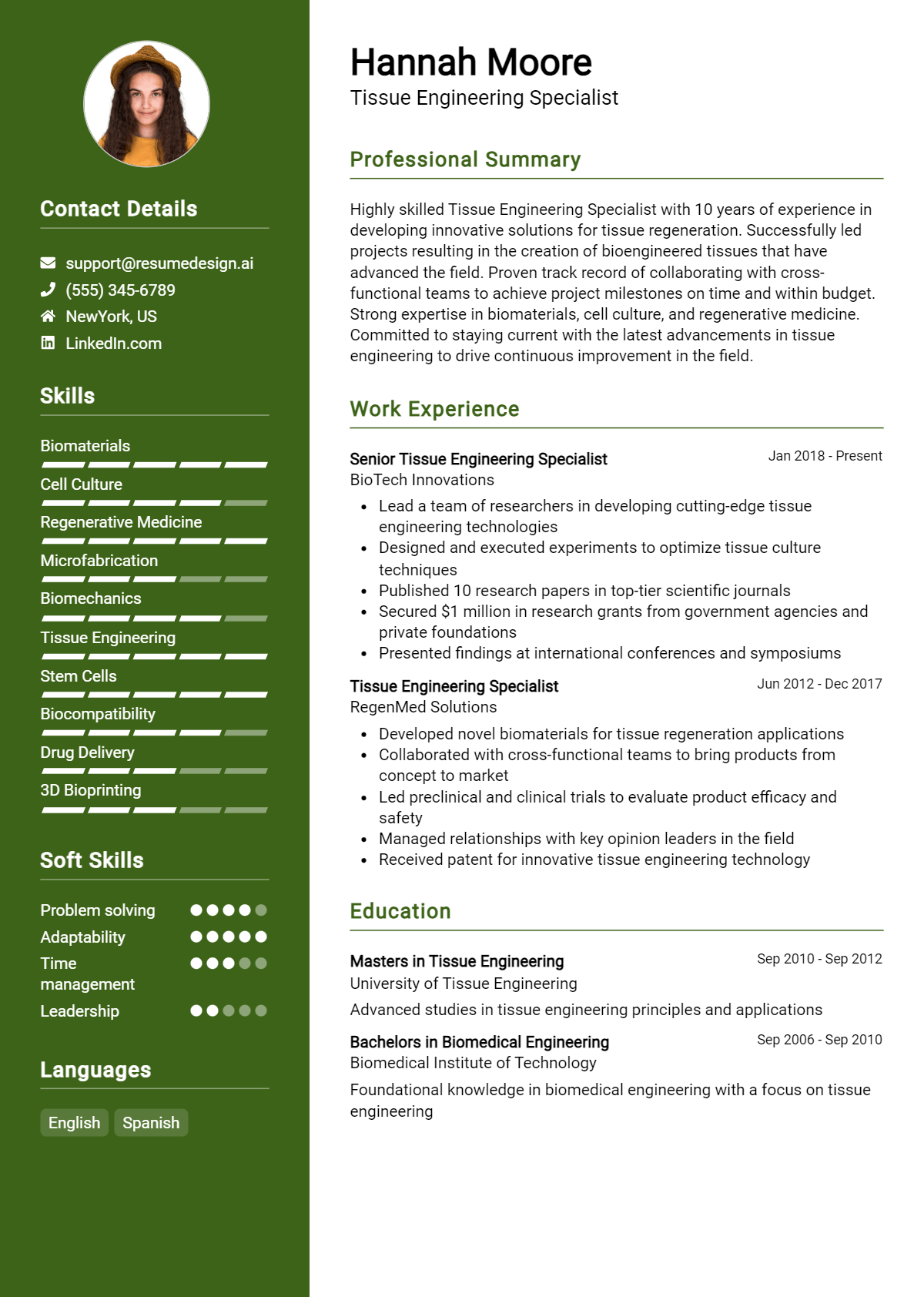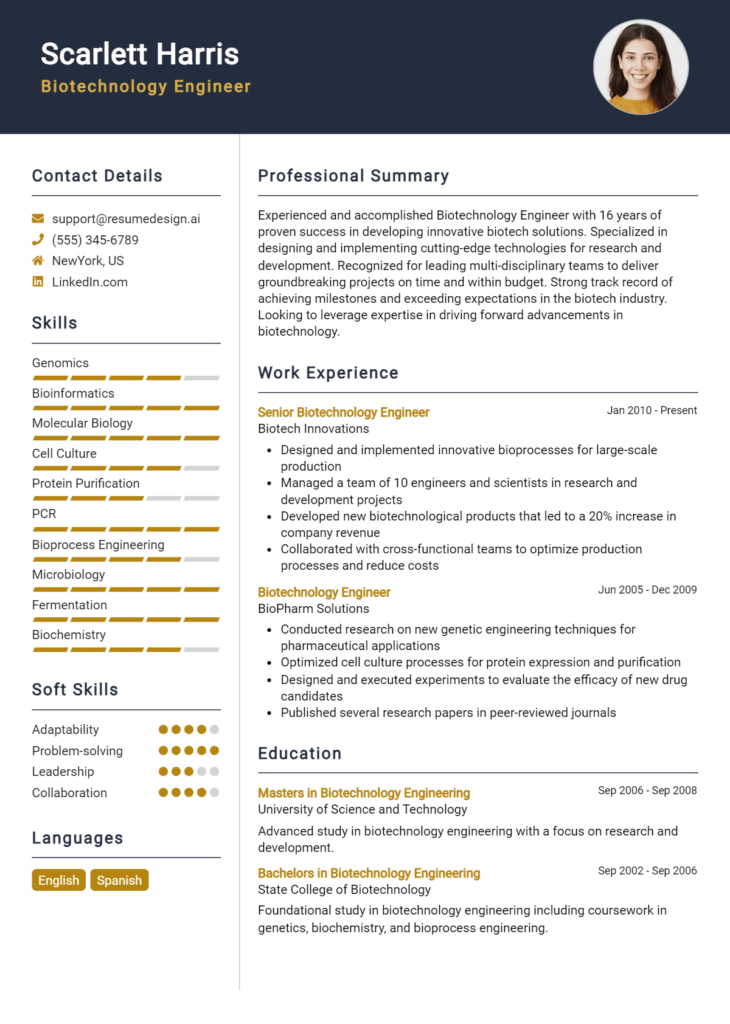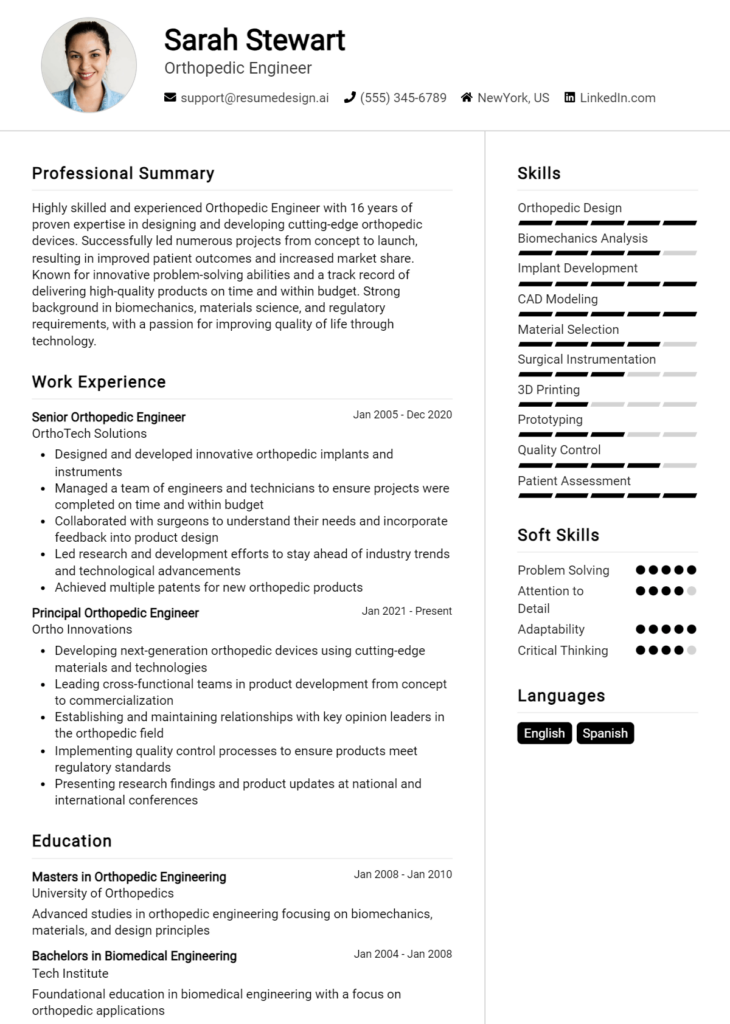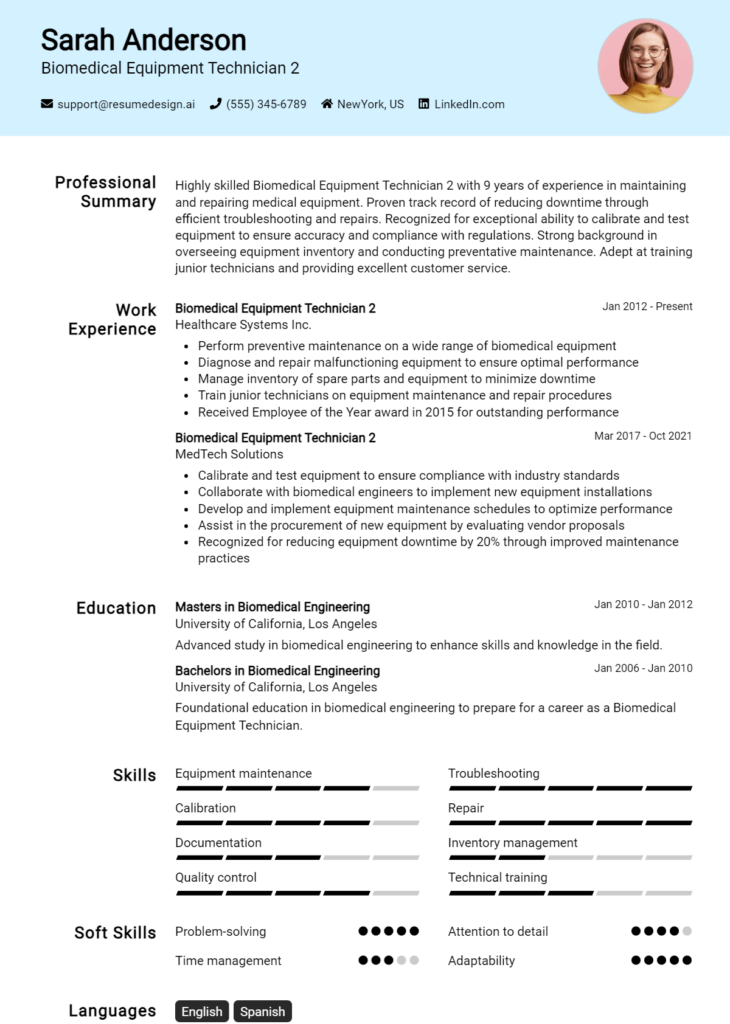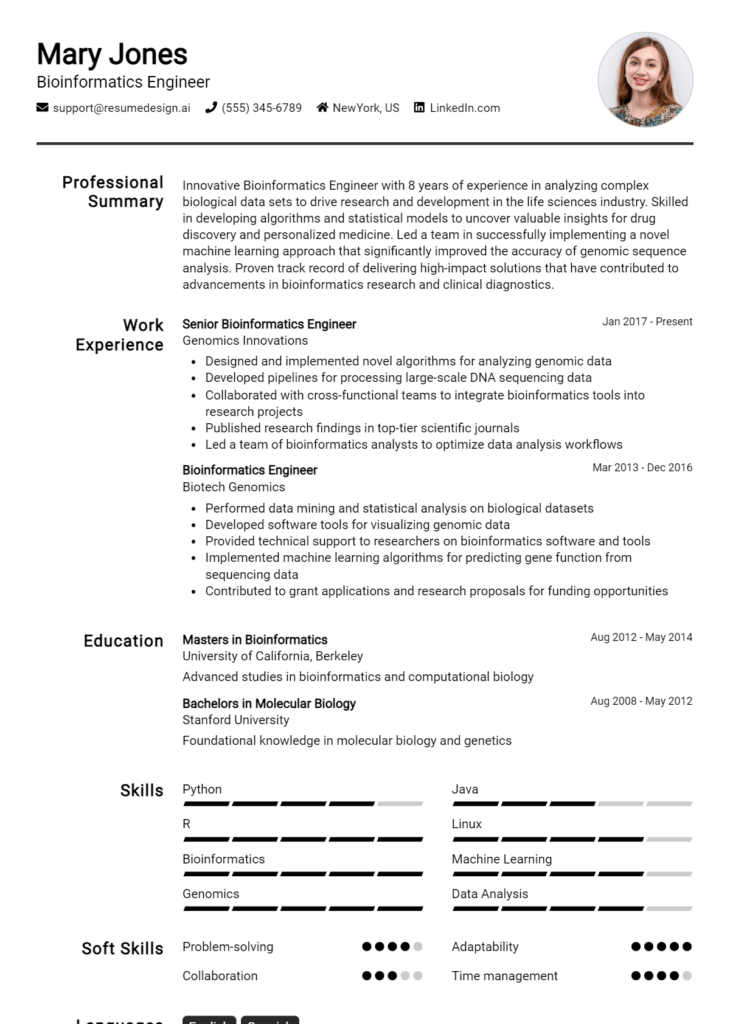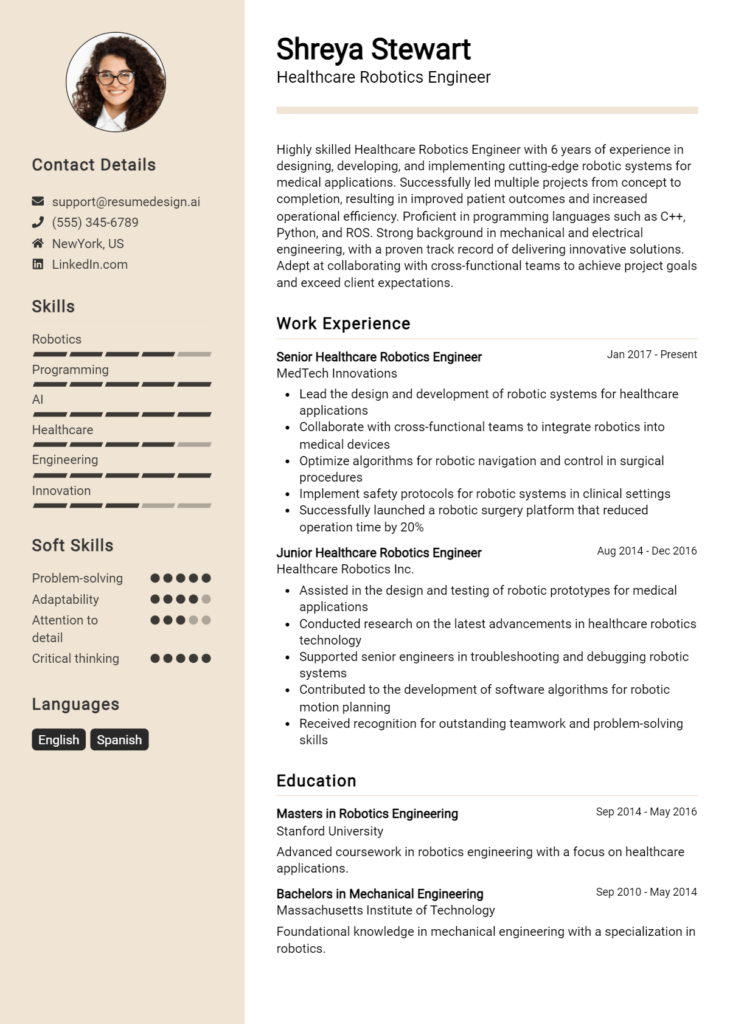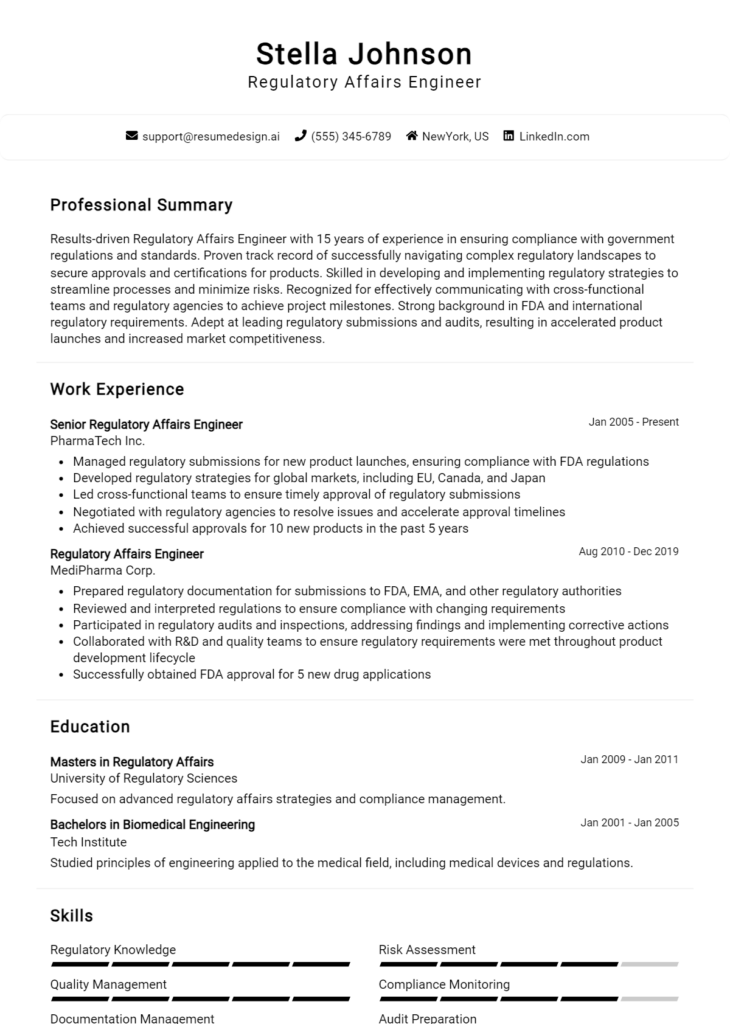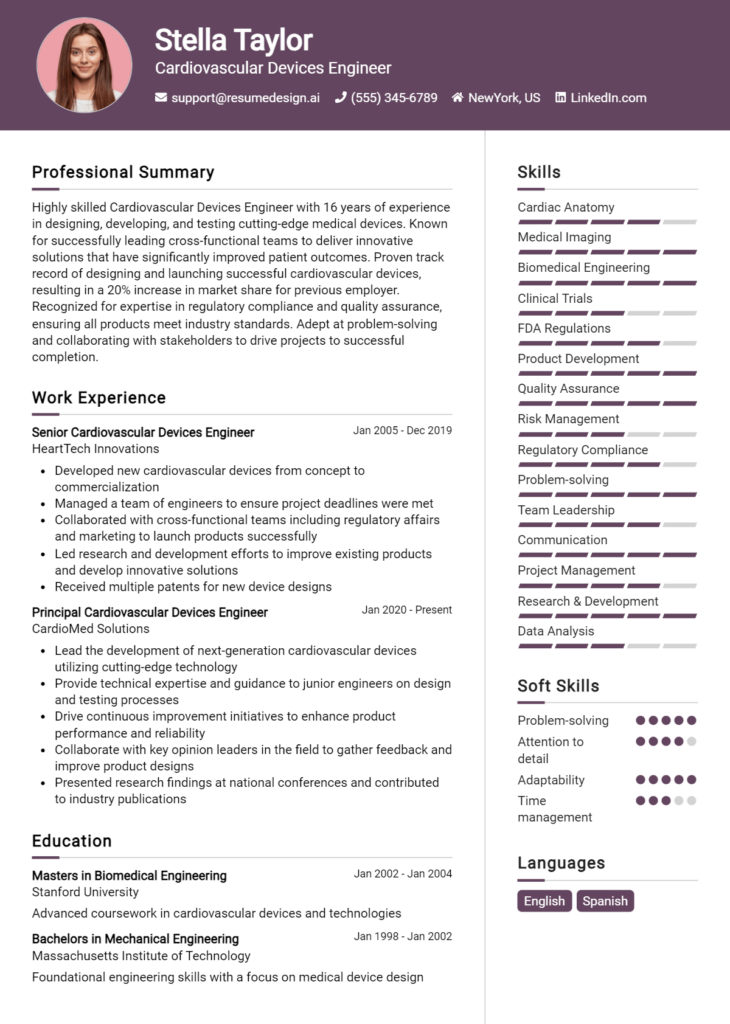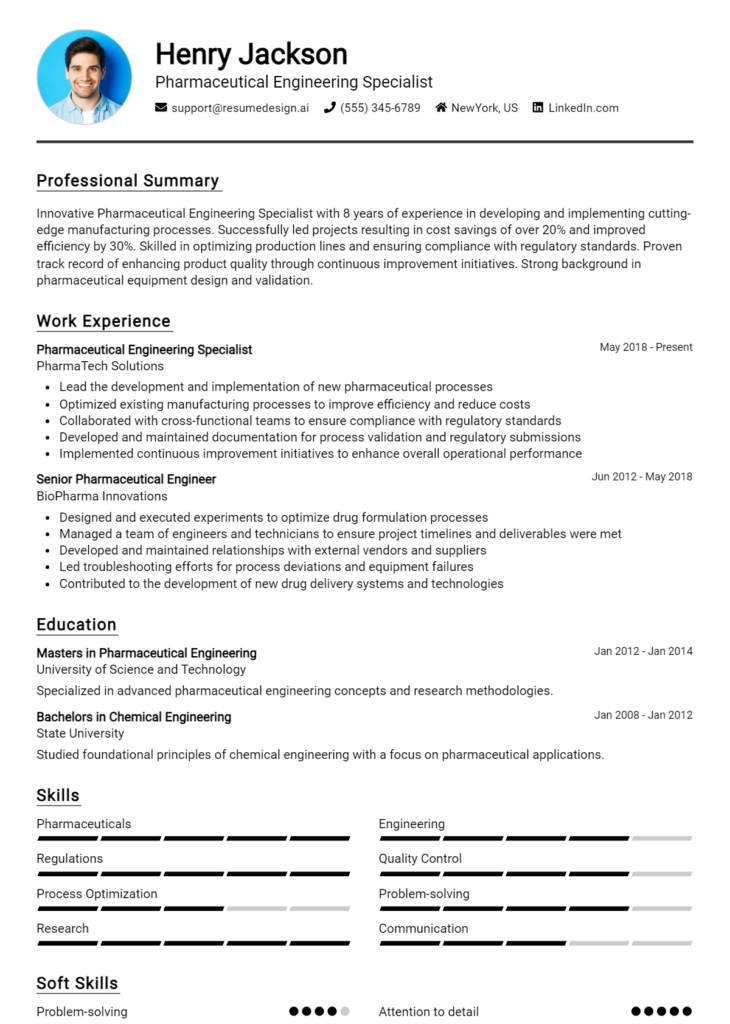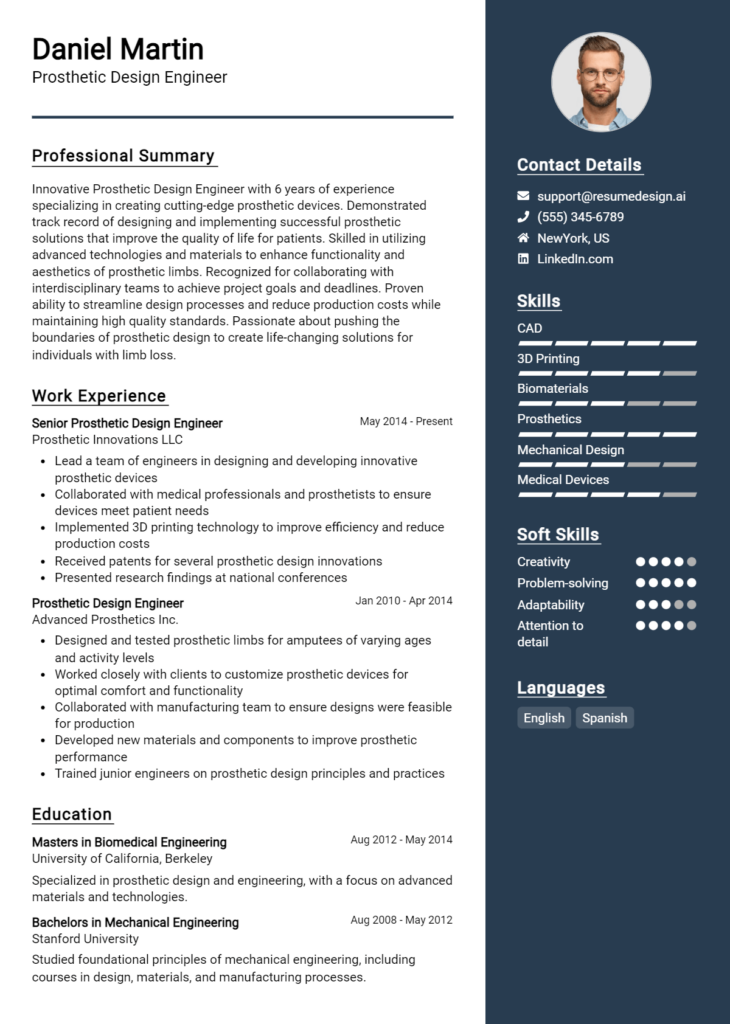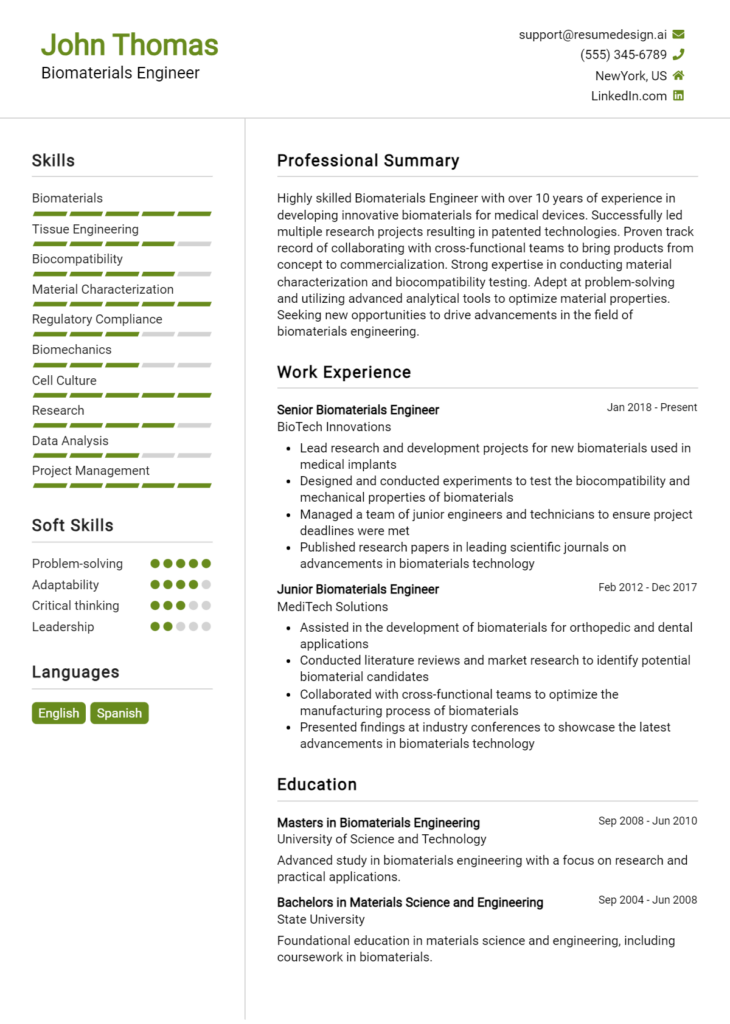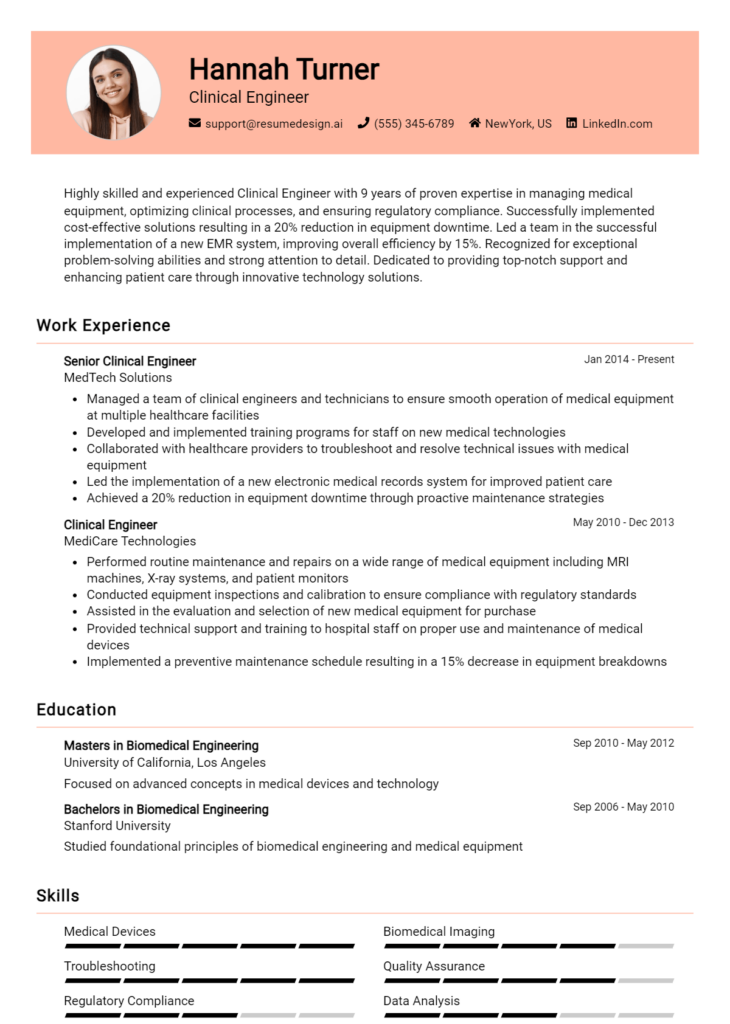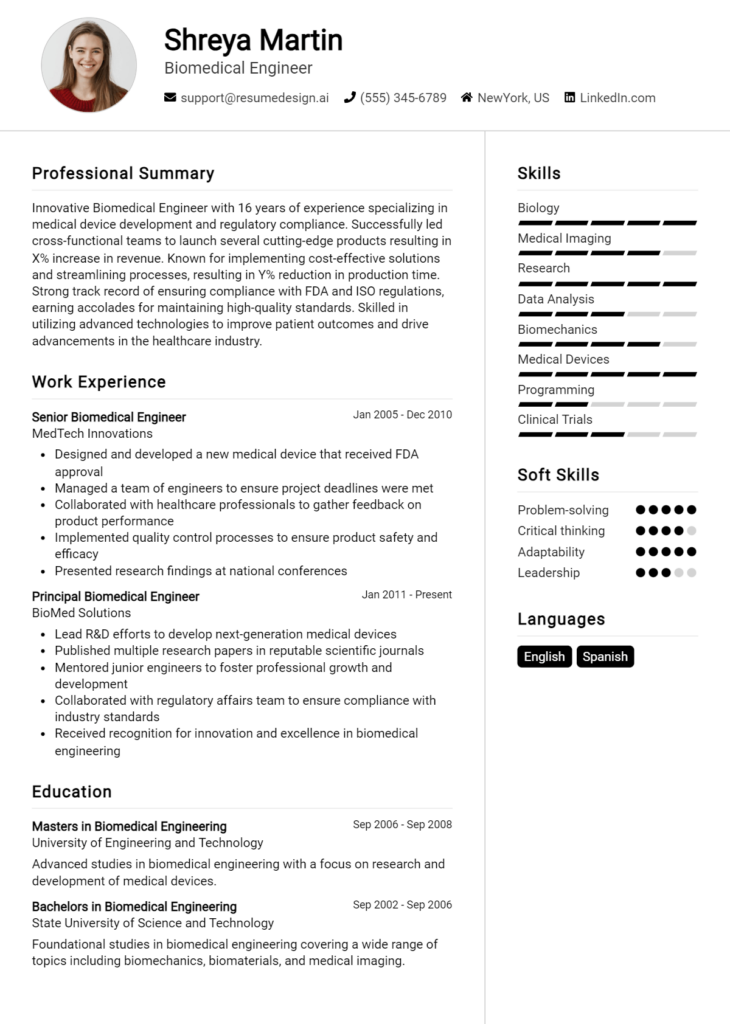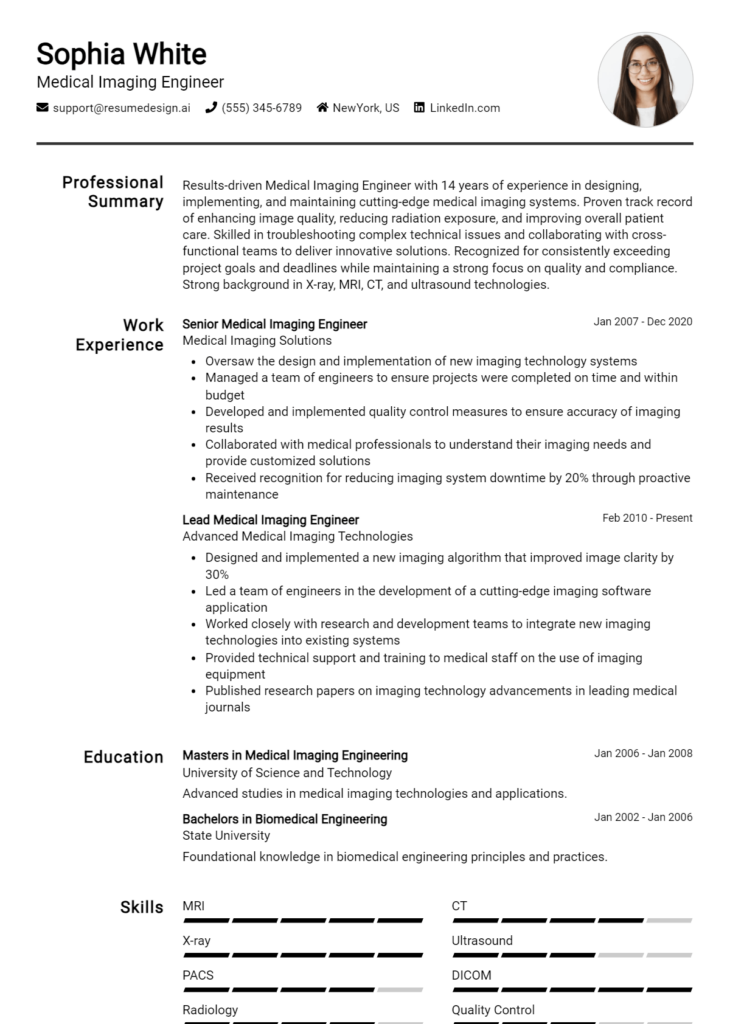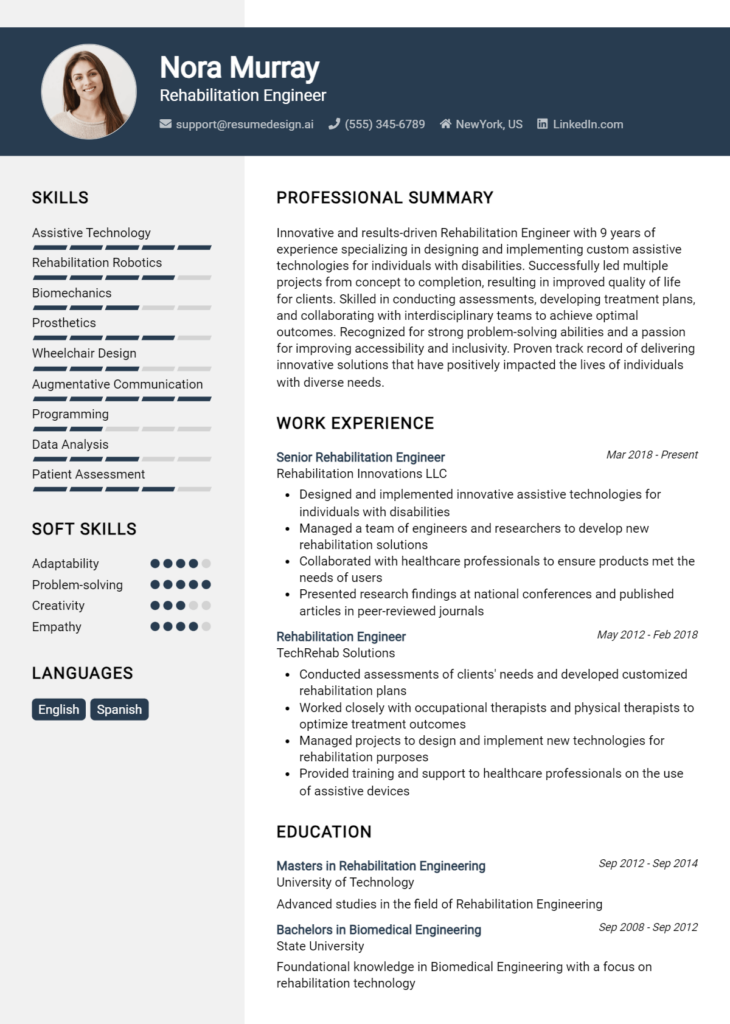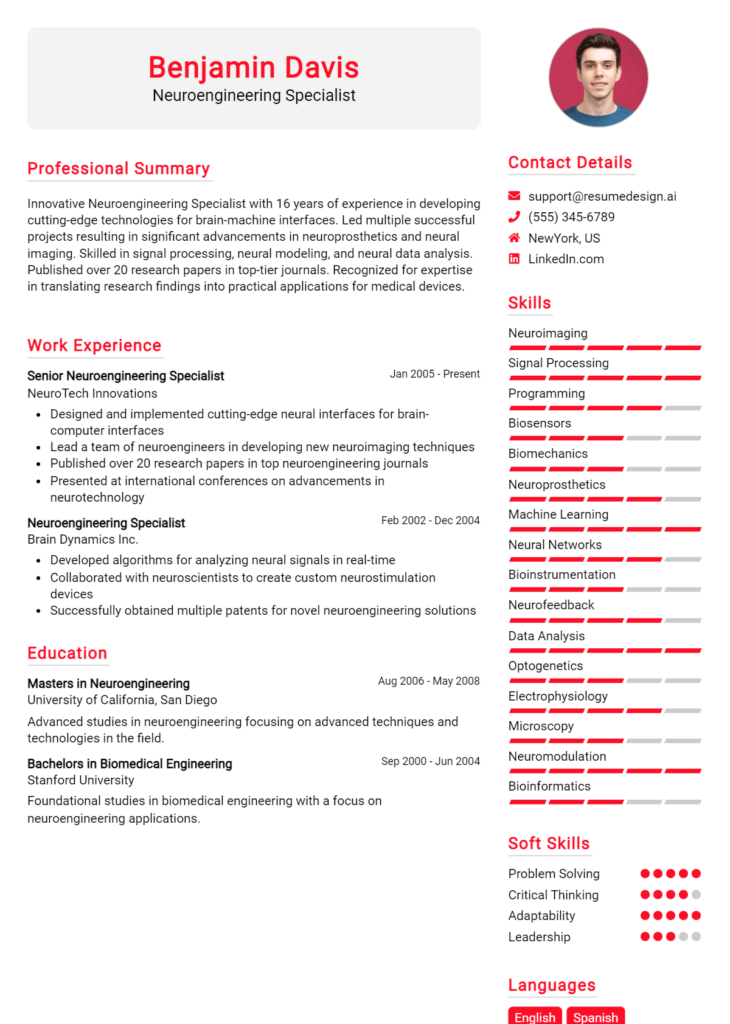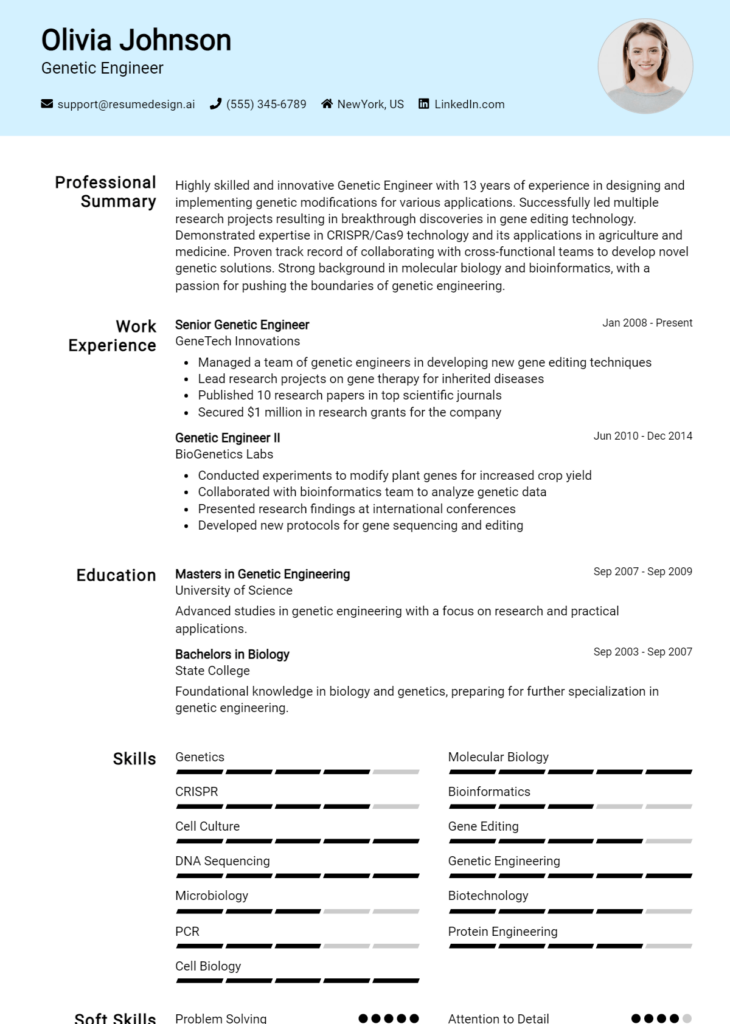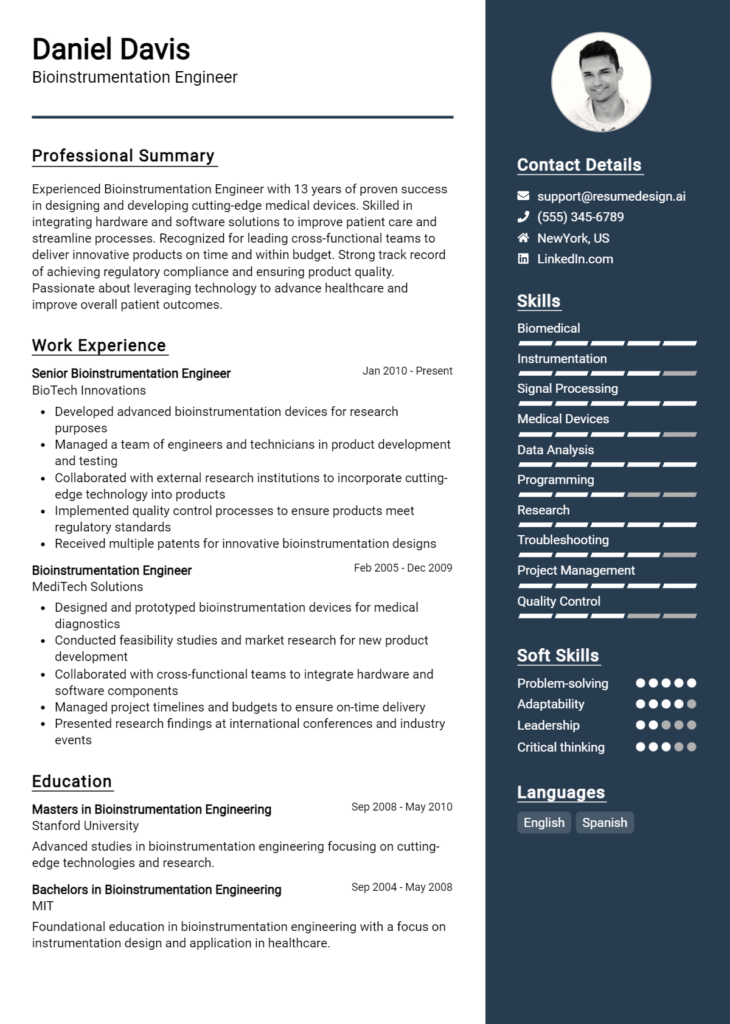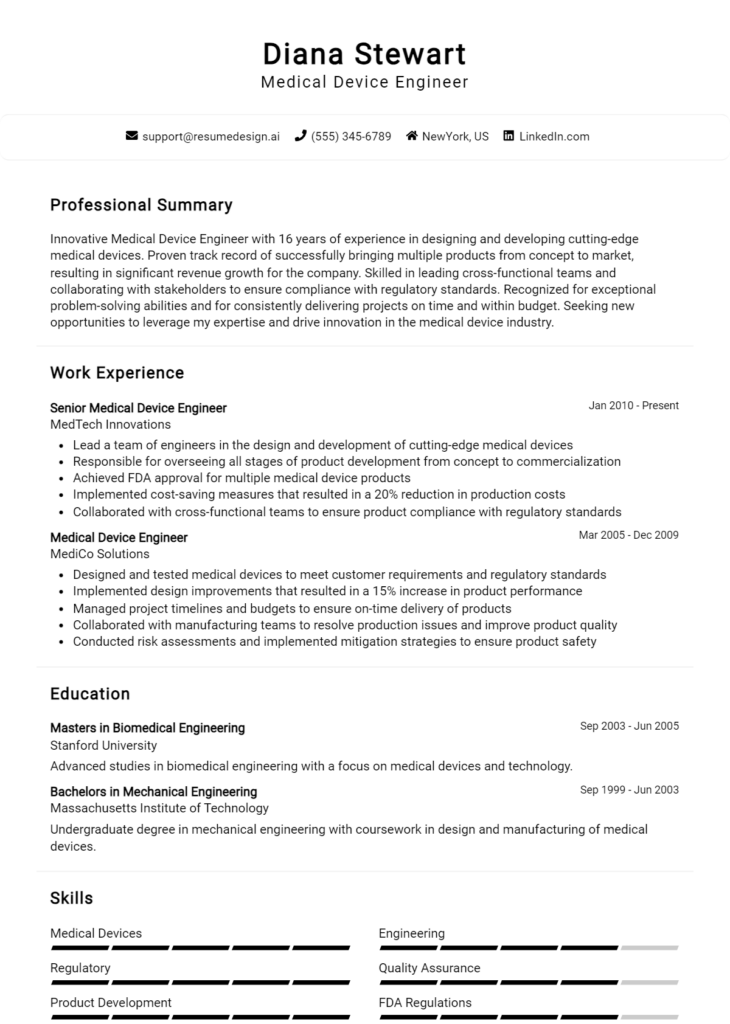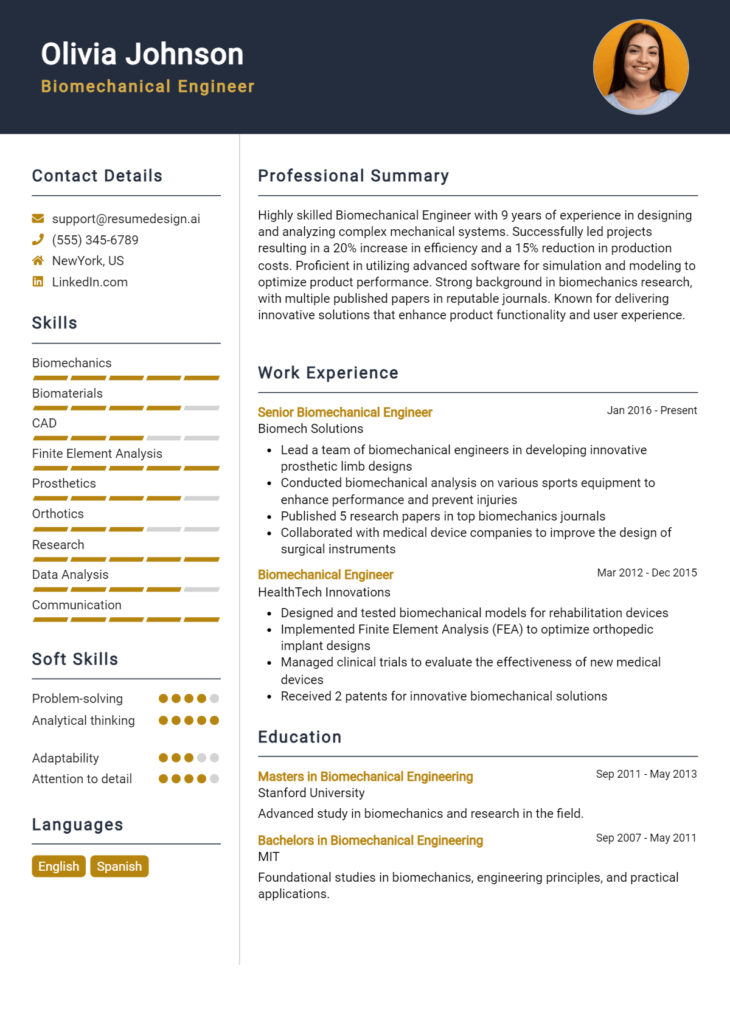Tissue Engineering Specialist Core Responsibilities
A Tissue Engineering Specialist is pivotal in developing biological substitutes to restore, maintain, or improve tissue function. This role requires strong technical knowledge in biomaterials, cell culture, and regenerative medicine, alongside operational skills for project management and regulatory compliance. Problem-solving abilities are crucial for overcoming challenges in research and development. By bridging departments such as biology, engineering, and clinical practice, these specialists contribute significantly to an organization’s innovation goals. A well-structured resume is essential to effectively showcase these qualifications and experiences.
Common Responsibilities Listed on Tissue Engineering Specialist Resume
- Design and develop tissue-engineered constructs for regenerative applications.
- Conduct in vitro and in vivo experiments to evaluate tissue performance.
- Collaborate with cross-functional teams including biologists, engineers, and clinicians.
- Analyze data and interpret results to inform experimental design.
- Ensure compliance with regulatory standards and safety protocols.
- Prepare technical documentation and reports for research findings.
- Provide training and mentorship to junior staff and interns.
- Stay updated on advancements in biomaterials and tissue engineering techniques.
- Participate in grant writing and funding proposals for research projects.
- Develop and optimize protocols for cell culture and tissue fabrication.
- Assist in troubleshooting and resolving technical issues in laboratory settings.
High-Level Resume Tips for Tissue Engineering Specialist Professionals
A well-crafted resume is essential for Tissue Engineering Specialist professionals, as it serves as the first impression a candidate makes on potential employers. In a field that combines biology, engineering, and material science, your resume must effectively showcase your unique skills and achievements. It is not just a list of jobs; it is a marketing tool that highlights your qualifications and sets you apart from the competition. This guide will provide practical and actionable resume tips specifically tailored for Tissue Engineering Specialist professionals, ensuring that you present your best self to prospective employers.
Top Resume Tips for Tissue Engineering Specialist Professionals
- Tailor your resume to match the job description, emphasizing relevant skills and experiences that align with the specific requirements of the position.
- Highlight your educational background, including degrees and certifications that are pertinent to tissue engineering and related fields.
- Showcase relevant experience in tissue engineering, including internships, research projects, and work history that demonstrate your expertise.
- Quantify your achievements where possible, using metrics and data to illustrate the impact of your work (e.g., improved cell viability by X%).
- Include industry-specific skills such as biomaterials development, cellular biology techniques, and 3D bioprinting knowledge.
- Utilize action verbs to describe your responsibilities and accomplishments, making your contributions more dynamic and engaging.
- Incorporate keywords from the job description to pass through applicant tracking systems (ATS) and capture the attention of hiring managers.
- Keep your resume concise and to the point, ideally within one to two pages, focusing on the most relevant information.
- Proofread for errors in spelling and grammar, as attention to detail is critical in a scientific field like tissue engineering.
- Consider including a summary statement that encapsulates your professional identity and career goals, tailored to the tissue engineering industry.
By implementing these tips, you can significantly increase your chances of landing a job in the Tissue Engineering Specialist field. A focused and well-structured resume will not only highlight your qualifications but also demonstrate your understanding of the industry's demands, making you a more attractive candidate to potential employers.
Why Resume Headlines & Titles are Important for Tissue Engineering Specialist
In the competitive field of tissue engineering, a well-crafted resume headline or title is essential for standing out to hiring managers. A strong headline serves as a powerful first impression, summarizing a candidate's key qualifications and unique selling points in just a few impactful words. It should be concise, relevant, and directly aligned with the job being applied for, allowing hiring managers to quickly grasp the candidate's potential fit for the role. An effective headline can capture attention, encourage further reading, and set the tone for the rest of the resume.
Best Practices for Crafting Resume Headlines for Tissue Engineering Specialist
- Keep it concise: Aim for one to two impactful phrases.
- Be specific: Use precise terms that reflect your expertise in tissue engineering.
- Highlight key skills: Incorporate relevant technical skills or certifications.
- Use action verbs: Start with strong action words to convey dynamism.
- Tailor it to the job: Align your headline with the specific job description.
- Showcase achievements: Mention notable accomplishments that set you apart.
- Avoid jargon: Use clear language that is easily understood by hiring managers.
- Maintain professionalism: Ensure the tone is formal and suitable for the industry.
Example Resume Headlines for Tissue Engineering Specialist
Strong Resume Headlines
Innovative Tissue Engineering Specialist with 5+ Years of Experience in Regenerative Medicine
Results-Driven Biomaterials Researcher with Proven Success in Developing Scaffolding Solutions
Dedicated Regenerative Medicine Expert Skilled in Stem Cell Applications and Tissue Regeneration
Weak Resume Headlines
Job Seeker in Tissue Engineering
Experienced Professional Looking for Opportunities
The strong headlines are effective because they immediately convey specific skills and experience relevant to the tissue engineering field, capturing the essence of the candidate's qualifications. They are action-oriented and tailored to the job, making them compelling for hiring managers. In contrast, the weak headlines lack specificity and fail to communicate any unique strengths or qualifications, rendering them generic and unmemorable, which diminishes the applicant's chances of standing out in a competitive job market.
Writing an Exceptional Tissue Engineering Specialist Resume Summary
A well-crafted resume summary is crucial for a Tissue Engineering Specialist as it serves as the first impression for hiring managers. This brief yet powerful section succinctly encapsulates a candidate’s key skills, relevant experience, and notable accomplishments, immediately capturing attention amid a sea of applicants. A strong summary not only highlights qualifications pertinent to the role but also establishes the candidate's potential value to the organization. By being concise and impactful, the summary should be tailored specifically to the job being applied for, setting the tone for the rest of the resume.
Best Practices for Writing a Tissue Engineering Specialist Resume Summary
- Quantify achievements to provide tangible evidence of your contributions and successes.
- Focus on relevant skills that align with the job description, including technical and soft skills.
- Tailor the summary for each job application to reflect keywords and requirements from the job listing.
- Use action verbs to convey a sense of proactivity and impact.
- Keep it concise, ideally within 3-5 sentences, to maintain the reader’s attention.
- Highlight unique qualifications or experiences that distinguish you from other candidates.
- Incorporate industry-specific terminology to demonstrate expertise and familiarity with the field.
- Ensure clarity and coherence, avoiding jargon that might confuse the reader.
Example Tissue Engineering Specialist Resume Summaries
Strong Resume Summaries
Dynamic Tissue Engineering Specialist with over 5 years of experience in developing biocompatible scaffolds, leading to a 30% increase in cell viability in regenerative medicine applications. Proven track record of collaborating with multidisciplinary teams to innovate solutions that enhance tissue regeneration.
Results-driven professional specializing in tissue engineering with expertise in 3D bioprinting and biomaterials. Successfully managed projects that reduced production time by 25%, while improving material efficiency and reducing costs by 15%.
Innovative Tissue Engineering Specialist skilled in stem cell technology and tissue scaffolding. Developed a novel protocol that improved the integration of engineered tissues in preclinical studies, resulting in a 40% enhancement in graft survival rates.
Weak Resume Summaries
Experienced in tissue engineering and related fields, looking for new opportunities to apply my skills.
A dedicated professional with knowledge in tissue engineering, seeking to contribute to a team.
The examples provided illustrate the difference between strong and weak resume summaries effectively. Strong summaries are characterized by their specificity and quantifiable achievements, clearly demonstrating the candidate's impact in previous roles and their relevance to potential employers. In contrast, weak summaries are vague, lacking detail and measurable outcomes, which makes it difficult for hiring managers to assess the candidate's qualifications and potential contributions to the company.
Work Experience Section for Tissue Engineering Specialist Resume
The work experience section of a Tissue Engineering Specialist resume is a pivotal component that illustrates the candidate's technical skills, leadership capabilities, and commitment to producing high-quality results. This section not only provides insights into the candidate's hands-on experience in tissue engineering but also demonstrates their ability to manage teams effectively and deliver products that meet rigorous industry standards. By quantifying achievements and aligning experiences with industry benchmarks, candidates can significantly enhance their appeal to prospective employers, showcasing their value in the competitive field of tissue engineering.
Best Practices for Tissue Engineering Specialist Work Experience
- Highlight specific technical skills relevant to tissue engineering, such as biomaterials, cell culture techniques, and scaffold design.
- Use quantifiable results to demonstrate the impact of your work, such as percentages, timeframes, or cost savings.
- Detail leadership experiences, showcasing your ability to lead projects or manage teams effectively.
- Collaborate with cross-functional teams, emphasizing your role in interdisciplinary projects.
- Tailor your experiences to match the job description, ensuring alignment with the employer's needs.
- Include any certifications or training related to tissue engineering that bolster your qualifications.
- Utilize action verbs to convey a sense of proactivity and initiative in your work experience statements.
- Keep descriptions concise while ensuring they highlight key achievements and responsibilities.
Example Work Experiences for Tissue Engineering Specialist
Strong Experiences
- Led a cross-functional team in developing a novel scaffold material, resulting in a 30% increase in cell viability compared to existing products.
- Managed a project that successfully reduced production costs by 25% while maintaining compliance with FDA regulations.
- Published three peer-reviewed articles on tissue regeneration techniques, contributing to advancements in the field and enhancing company reputation.
- Collaborated with biomedical engineers and clinicians to design a tissue graft that improved patient recovery times by 15% in clinical trials.
Weak Experiences
- Worked on various projects related to tissue engineering.
- Assisted in the lab with some experiments and data collection.
- Participated in team meetings to discuss project updates.
- Helped with general lab maintenance and organization tasks.
The examples categorized as strong experiences effectively showcase specific achievements and quantifiable outcomes, reflecting a proactive approach and technical leadership. In contrast, the weak experiences lack detail and measurable results, making it difficult to ascertain the candidate's impact or skills. Strong experiences highlight a candidate's contributions and expertise, while weak experiences leave an ambiguous impression that fails to convey competence in the field of tissue engineering.
Education and Certifications Section for Tissue Engineering Specialist Resume
The education and certifications section of a Tissue Engineering Specialist resume is crucial as it represents the foundational knowledge and specialized skills necessary for success in this advanced field. This section not only showcases the candidate's academic background but also highlights their commitment to continuous learning through industry-relevant certifications and specialized training. By providing details on relevant coursework, certifications, and ongoing educational efforts, candidates can significantly enhance their credibility and demonstrate their alignment with the specific requirements of the job role.
Best Practices for Tissue Engineering Specialist Education and Certifications
- Prioritize relevant degrees such as a Master's or Ph.D. in Tissue Engineering, Biomedical Engineering, or a related field.
- Include industry-recognized certifications, such as the Certified Tissue Engineer (CTE) or similar credentials.
- Highlight any specialized training or workshops that pertain directly to tissue engineering techniques.
- Provide detailed descriptions of relevant coursework that reflects an understanding of cellular biology, biomaterials, and regenerative medicine.
- Emphasize any interdisciplinary studies that showcase a broad knowledge base applicable to tissue engineering.
- Keep the information up-to-date, ensuring that all qualifications reflect the latest advancements in the field.
- Use clear and concise language to describe certifications and educational achievements, making it easy for hiring managers to assess qualifications quickly.
- Consider including honors or awards received during academic pursuits to further demonstrate excellence in the field.
Example Education and Certifications for Tissue Engineering Specialist
Strong Examples
- M.S. in Biomedical Engineering, University of California, 2021
- Certified Tissue Engineer (CTE), 2022
- Coursework: Advanced Biomaterials, Stem Cell Biology, and Regenerative Medicine Techniques
- Workshop: 3D Bioprinting Techniques for Tissue Engineering, 2023
Weak Examples
- Bachelor's Degree in Business Administration, 2019
- Certification in Project Management, 2020
- Coursework: Introduction to Psychology and Sociology
- Basic First Aid Certification, 2021
The examples provided demonstrate the importance of relevance and alignment with the Tissue Engineering Specialist role. Strong examples showcase advanced degrees and specialized certifications that directly apply to the field, illustrating both expertise and commitment to professional development. In contrast, weak examples highlight qualifications that lack direct relevance to tissue engineering, such as unrelated degrees or generic certifications, which do not contribute effectively to the candidate's credibility in this specialized area.
Top Skills & Keywords for Tissue Engineering Specialist Resume
As a Tissue Engineering Specialist, showcasing the right skills on your resume is crucial for attracting the attention of potential employers. The field of tissue engineering is multidisciplinary, requiring a blend of technical expertise and interpersonal abilities. Highlighting both hard and soft skills not only demonstrates your qualifications but also your capacity to work collaboratively and effectively in a fast-paced research environment. Potential employers will look for candidates who can navigate the complexities of tissue engineering, from biomaterials and cellular biology to project management and communication. Crafting a well-rounded resume that emphasizes these skills can significantly enhance your chances of landing an interview.
Top Hard & Soft Skills for Tissue Engineering Specialist
Hard Skills
- Biomaterials development
- Cell culture techniques
- Tissue scaffolding
- Biomechanics
- 3D printing in tissue engineering
- Histology and microscopy
- Regulatory compliance (FDA, ISO)
- Molecular biology techniques
- Computational modeling
- Quality control and assurance
- Data analysis and interpretation
- Laboratory safety protocols
- Tissue characterization
- Bioinformatics
- Sterilization techniques
- Polymer science
- Chemical engineering principles
Soft Skills
- Strong communication skills
- Team collaboration
- Problem-solving abilities
- Critical thinking
- Attention to detail
- Project management
- Adaptability
- Creativity in research
- Time management
- Leadership potential
- Interpersonal skills
- Analytical thinking
- Conflict resolution
- Initiative and self-motivation
- Empathy and ethical considerations
- Networking and relationship building
- Teaching and mentoring capabilities
Incorporating these skills into your resume can greatly enhance your profile, making you a more attractive candidate in the competitive field of tissue engineering. Additionally, highlighting relevant work experience will further solidify your qualifications and readiness for the role.
Stand Out with a Winning Tissue Engineering Specialist Cover Letter
Dear Hiring Manager,
I am writing to express my interest in the Tissue Engineering Specialist position at [Company Name] as advertised. With a strong academic background in biomedical engineering and over five years of hands-on experience in tissue regeneration and biomaterials research, I am excited about the opportunity to contribute to your innovative team. My expertise in developing scaffolds for cell culture and my proficiency in utilizing advanced imaging techniques align well with the goals set forth by your organization.
In my previous role at [Previous Company Name], I successfully led a project focused on creating biocompatible hydrogels for cartilage repair, which resulted in a 30% improvement in cell viability and proliferation. This experience honed my skills in both lab techniques and project management, as I collaborated with cross-functional teams and communicated our findings at industry conferences. I am particularly drawn to [Company Name] because of your commitment to advancing regenerative medicine and your groundbreaking work in developing personalized tissue engineering solutions. I am eager to bring my skills in research design and data analysis to help drive your projects forward.
Furthermore, I am passionate about staying at the forefront of tissue engineering advancements. I regularly attend workshops and seminars to expand my knowledge and skills in the field. I am particularly interested in exploring the potential of 3D bioprinting and stem cell technologies as they relate to tissue engineering applications. I believe that my proactive approach to professional development, combined with my technical expertise, positions me as a valuable asset to your team.
I am excited about the possibility of joining [Company Name] and contributing to your mission of transforming healthcare through innovative tissue engineering solutions. Thank you for considering my application. I look forward to the opportunity to discuss how my background, skills, and enthusiasms align with the needs of your team.
Sincerely,
[Your Name]
[Your Contact Information]
Common Mistakes to Avoid in a Tissue Engineering Specialist Resume
Crafting a resume for a Tissue Engineering Specialist role requires attention to detail and a clear presentation of relevant skills and experiences. However, many candidates make common mistakes that can hinder their chances of landing an interview. Avoiding these pitfalls can significantly enhance your resume's effectiveness and showcase your qualifications in a compelling manner.
Overloading with Technical Jargon: While technical terms are important, excessive jargon can alienate hiring managers who may not have a deep understanding of specific terminology. Aim for clarity and balance.
Ignoring Relevant Experience: Failing to highlight specific experiences related to tissue engineering, such as internships or research projects, can make your resume appear generic. Tailor your resume to showcase relevant roles and responsibilities.
Lack of Quantifiable Achievements: Describing tasks without quantifying achievements can make your contributions seem less impactful. Use metrics to illustrate your successes, such as improved cell growth rates or successful project completions.
Using a One-Size-Fits-All Format: A resume that isn’t tailored to the position can detract from your qualifications. Customize your resume for each application, emphasizing the skills and experiences that align with the job description.
Neglecting Soft Skills: Technical expertise is crucial, but soft skills like teamwork, communication, and problem-solving are equally important. Be sure to include examples that demonstrate these abilities.
Poor Organization and Layout: A cluttered or difficult-to-read resume can frustrate hiring managers. Use clear headings, bullet points, and consistent formatting to make your resume easy to navigate.
Failing to Proofread: Spelling and grammatical errors can create a negative impression. Always proofread your resume multiple times and consider having someone else review it for errors before submission.
Omitting Continuing Education: In a rapidly evolving field like tissue engineering, ongoing education is vital. Failing to mention relevant courses, certifications, or workshops can make your resume seem outdated.
Conclusion
As a Tissue Engineering Specialist, you play a pivotal role in advancing medical science through the development of biological substitutes that restore, maintain, or improve tissue functions. Your expertise in cell biology, biomaterials, and scaffold design is essential for addressing complex challenges in regenerative medicine.
Throughout this article, we have discussed the critical skills and qualifications required for success in this field, including a strong foundation in biology and material science, hands-on laboratory experience, and the ability to work collaboratively in multidisciplinary teams. We also highlighted the importance of staying updated with the latest research and technological advancements, as well as the growing demand for professionals in tissue engineering across various sectors, including pharmaceuticals, biotechnology, and healthcare.
To ensure that your qualifications and experience are effectively showcased to potential employers, now is the perfect time to review your resume. Consider utilizing helpful resources such as resume templates, a resume builder, and resume examples to craft a compelling and professional document. Additionally, enhance your application with tailored cover letter templates that highlight your unique contributions to the field of tissue engineering. Take action today to position yourself as a top candidate in this dynamic and rewarding career!

